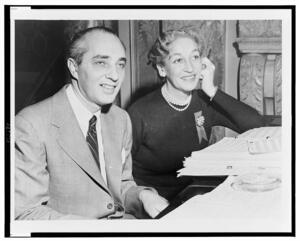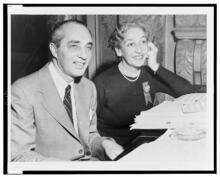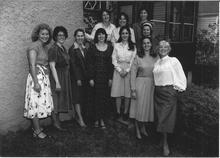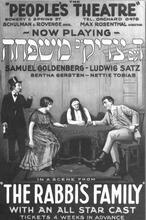Dorothy Fields
Songwriter and composer Dorothy Fields (1905–1974) and Arthur Schwartz work on score of "A Tree Grows in Brooklyn."
Photo by Walter Albertin, 1951. Source: Library of Congress Prints and Photographs Division. New York World-Telegram and the Sun Newspaper Photograph Collection.
Dorothy Fields wrote songs for a wide variety of musicals that became classics of American culture, from “Hey Big Spender” to “A Fine Romance” and “The Way You Look Tonight,” which won an Academy Award in 1936. Fields joined the vaudeville family business after high school, penning songs for Cotton Club acts. She wrote the lyrics for songs in more than twenty-five films and theatrical productions, including Sweet Charity, Annie Get Your Gun, Swing Time, and A Tree Grows in Brooklyn, both alone and with collaborators who included her brother Howard and musical legends Irving Berlin, Cy Coleman, and Jerome Kern. In 1971, when the Songwriters’ Hall of Fame held its first annual nominations, Dorothy Fields was the only woman named to the ballot.
A lyricist and librettist whose work embraces the bouncy optimism of “On the Sunny Side of the Street,” the brassy seductiveness of “Hey, Big Spender,” and the tender musings of “The Way You Look Tonight,” Dorothy Fields wrote the words to more than four hundred songs in a career that spanned half a century. In a casual and colloquial voice that spoke to the many moods of the human heart, she set her lyrics to the melodies of some of America’s best-known and best-loved composers. When Fred Astaire wooed Ginger Rogers with “I Won’t Dance,” when he pouted over her reluctance in “A Fine Romance,” when Judy Garland belted out “I Feel a Song Coming On,” they sang the words penned by Dorothy Fields. She wrote the book and lyrics to Cy Coleman’s music for Sweet Charity and Seesaw and spent the last day of her life on March 28, 1974, watching a tour company rehearsal of Seesaw, her nineteenth Broadway musical.
Early Life and Family
One of the four children of comedian-actor-producer-director Lew Fields of the famed Weber and Fields vaudeville team, Dorothy Fields was born in Allenhurst, New Jersey, on July 15, 1904. Along with her brothers Joseph and Herbert, she followed her father’s footsteps into the theater—albeit against his better judgment.
Songwriting Career
After attending public school in New York City, she turned to writing songs for revues at the Cotton Club in New York City. Pairing up with Jimmy McHugh in 1928, she wrote lyrics for “Lew Leslie’s Blackbirds,” “I Can’t Give You Anything But Love,” “On the Sunny Side of the Street,” “I’m in the Mood for Love,” “Exactly Like You,” and “Don’t Blame Me.” In later years, she would collaborate with her brother Herbert on the books for such blockbuster musicals as Annie Get Your Gun, Redhead, Up in Central Park, and A Tree Grows in Brooklyn. Fields’s lyrics for the ballads “Close as Pages in a Book” and “I’ll Buy You a Star” epitomize the seamless melding of poetic imagery into a romantic refrain that marks so many of her songs.
Although she wrote lyrics for songs in at least twenty-five films, Dorothy Fields’s most famous Hollywood collaboration was with composer Jerome Kern, to whom she referred as her idol. She was working at RKO Studios when the producer of the movie version of Roberta gave her a melody Kern had added to the score. “The words I came up with were ‘Lovely to Look At,’” she recalled in 1966. “Jerry was delighted with them and asked me to work with him on his next picture, Swing Time.” From that union came “The Way You Look Tonight” which won both lyricist and composer Oscars for the best song of 1936. Two years later, Dorothy Fields engaged in a different kind of union, marrying Eli D. Lahm. Their son, David, was born in 1941, and their daughter, Eliza, in 1944.
Legacy
When in 1971 the Songwriters’ Hall of Fame held the first of what would become its annual elections, Dorothy Fields was the only woman to be named. A minority by virtue of her gender, she was hardly an anomaly as a Jew. The backstage world was dominated by immigrant, first- and second-generation Jewish Americans who found, in the explosive world of twentieth-century show business, releases for creative energies pent up by centuries of European oppression. In the realm of songwriting, Jewish talent flowed as if from a cornucopia: Irving Berlin, George and Ira Gershwin, Richard Rodgers, Lorenz Hart, Oscar Hammerstein II, Jerome Kern, Leonard Bernstein, Kurt Weill, Stephen Sondheim, Betty Comden, and, not least among them, the lyricist who warned an enticing dancing partner, “For heaven rest us, we’re not asbestos”—Dorothy Fields.
Selected Works by Dorothy Fields
Musicals
Annie Get Your Gun. Lyrics and music by Irving Berlin, book by Herbert and Dorothy Fields (1946).
By the Beautiful Sea. Music by Arthur Schwartz, lyrics by Dorothy Fields (1954).
Redhead. Music by Albert Hague, lyrics by Dorothy Fields (1959).
Seesaw. Book by Cy Coleman, lyrics by Dorothy Fields (1973).
Sweet Charity. Book by Neil Simon, music and lyrics by Cy Coleman and Dorothy Fields (1966).
Swing Time. Music by Jerome Kern, lyrics by Dorothy Fields (1936).
A Tree Grows in Brooklyn. Music by Arthur Schwartz, lyrics by Dorothy Fields (1951).
Up in Central Park. Book by Herbert and Dorothy Fields (1945).
Songs
“Close as Pages in a Book.”
“Don’t Blame Me.”
“Exactly Like You.”
“A Fine Romance.”
“Hey Big Spender.”
“I Can’t Give You Anything But Love.”
“I Feel a Song Coming On.”
“I’ll Buy You a Star.”
“I’m in the Mood for Love.”
“I Won’t Dance.”
“Lew Leslie’s Blackbirds,” with Jimmy McHugh.
“On the Sunny Side of the Street.”
“The Way You Look Tonight.”
AJYB 76:513.
“Dorothy Fields, Lyricist Dies.
Wrote 400 Songs in 50 Years.” NYTimes, March 29, 1974, 38:1.
Fordin, Hugh. Jerome Kern: The Man and His Music in Story, Picture, and Song (1975).
The New Grove Dictionary of American Music. Vol. II. Edited by H. Wiley Hitchcock and Stanley Sadie (1986).
NAW modern.
WWWIA 6.







